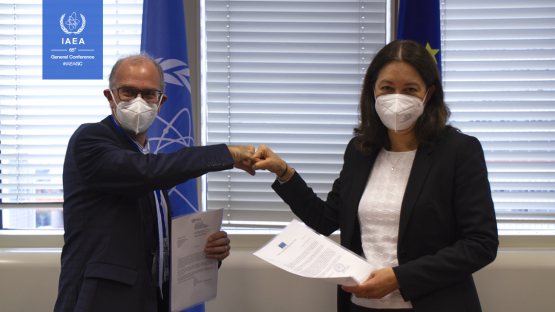Over a hundred nuclear safety review missions, environmental remediation at former uranium sites in Central Asia and more effective radioactive waste management in Africa: these are just some of the major achievements of the cooperation between the IAEA and the European Union (EU), which was extended today.
“Thanks to EU funding, the IAEA has responded to a high number of requests from countries looking for a tailored review of their national practices against the IAEA Safety Standards. The follow up actions implemented by the countries we visited have contributed to improving global nuclear safety,” said Lydie Evrard IAEA Deputy Director General and Head of the Department of Nuclear Safety and Security.
Meeting on the margins of this week’s 65th IAEA General Conference, the two sides extended their 2013 cooperation agreement on the safe management of radioactive waste, regulatory arrangements, safety reviews and assessments, emergency preparedness and response, environmental remediation and the development and application of IAEA Safety Standards.
“This joint decision today will help maintain the momentum we have built on our past joint achievements, and we look forward to working with the EU to continue addressing global nuclear safety challenges together,” said Lydie Evrard IAEA Deputy Director General and Head of the Department of Nuclear Safety and Security.
Massimo Garribba, Deputy Director General of the European Commission’s Energy Directorate-General welcomed the added value of the new agreement and “looked forward to a further deepening of cooperation in nuclear safety, including in the field of peer review missions.”
One of the IAEA’s flagship services is its array of peer reviews to assess nuclear safety and security practices in countries. The EU has supported the development of peer review services like the Integrated Regulatory Review Service (IRRS) and the Integrated Review Service for Radioactive Waste and Spent Fuel Management, Decommissioning and Remediation (ARTEMIS). In turn, these reviews have enabled compliance of EU countries with their obligations under the EU Nuclear Safety and Waste Directives. Since 2013, 116 IRRS missions and 12 ARTEMIS missions have been carried out to assess regulatory practices and radioactive waste and spent fuel management.







